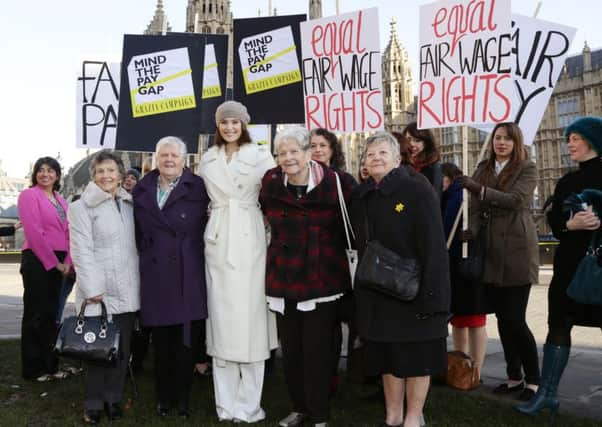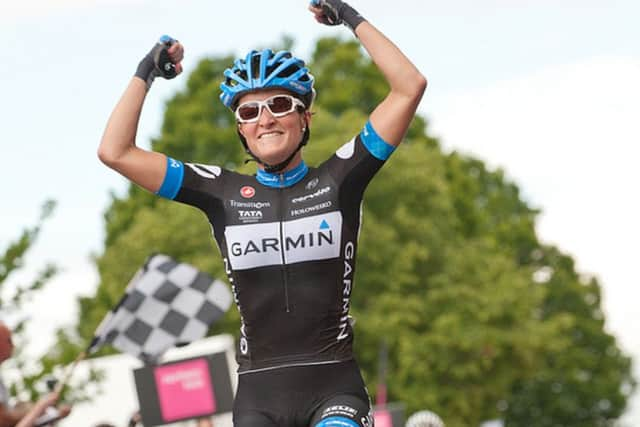Equal pay for women: Are we closing the gap?


The recent announcement that female cyclists in next month’s Tour de Yorkshire will stand to win more prize money than their male counterparts has been widely applauded.
For as well as making the Asda Women’s Tour de Yorkshire the most lucrative women’s bike race on the planet, it’s an opportunity for the likes of world champion cyclist Lizzie Armitstead, who is among the riders signed up to take on the route from her hometown of Otley to Doncaster, to earn more than the men.
Advertisement
Hide AdAdvertisement
Hide AdThe first prize of £15,000 - three times the sum Armitstead collected when she won the world championships in the United States last year - is higher than that of three men’s stage wins plus the overall general classification win combined.


The prize fund announcement was made by Welcome to Yorkshire alongside news that the women’s race will be broadcast live on ITV4 and Eurosport. It is, as Sir Gary Verity - chief executive of Welcome to Yorkshire - rightly claims, a “significant milestone for women’s racing.”
But such enlightened and progressive attitudes towards gender equality appear not be shared by everyone.
Last week, Raymond Moore, chief executive of the prestigious Indian Wells tennis tournament, sparked outrage with his crass comments that women’s tennis “rides on the coat-tails” of the men’s game and that female players should drop to their knees and “thank God that Roger Federer and Rafael Nadal were born, because they have carried this sport.” Moore apologised publicly and resigned as tournament director, but the damage had been done.
Advertisement
Hide AdAdvertisement
Hide AdThe men’s World No 1 Novak Djokovic then found himself being criticised after suggesting that men should be awarded more prize money. The Serb said women deserve the money they get, but claimed men should fight for more because their game attracts more viewers, although he later apologised saying he supported “equality” in sport.


But if there’s a gender pay gap in the tennis world then when it comes to football it’s not so much a gap as a chasm. Few, if any, of the top earners in the women’s game in the UK earn more than £100,000 a year - a figure that some top players in the men’s game get paid in a single week.
The Premier League, which last year agreed a TV deal worth more than £5bn with Sky and BT Sport to show live matches, is awash with money and a world away from the women’s game. “The gulf is massive when you compare the Premier League to our Super League,” says Glen Harris, manager of Doncaster Belles who recently returned to the top tier of women’s football.
“If you’re in the England women’s team then you can make a reasonable living out of football, but I would say that’s only really happened in the last three or four years.”
Advertisement
Hide AdAdvertisement
Hide AdDoncaster Belles include a mixture of professionals and part-time players who juggle football with careers outside the game. “There’s a real mix, we’ve got a firefighter and a teacher and a couple of university graduates who have left their jobs. Some of them have made a lot of sacrifices to follow their dream of playing football at the highest level,” says Harris.
Women’s football has none of the financial clout of the men’s game but Harris says its appeal is growing. “Over the past 18 months the women’s game has evolved greatly and there’s been much more TV exposure since the last World Cup. I think women’s football is moving in the right direction.”
The pay gap between men and women’s football comes down to simple commercial demand. But what is of greater concern is the general pace of change in this country when it comes to ensuring that female workers doing the same job as their male counterparts get exactly the same pay.
It’s more than 45 years since women workers at the Ford car plant in Dagenham got up from their sewing machines and walked out on strike. Their protests fanned out across the UK and led ultimately to the introduction of the Equal Pay Act in 1970, which outlawed discrimination on pay and conditions between men and women.
Advertisement
Hide AdAdvertisement
Hide AdBut the road to equality has proved woefully slow. A report published this month by the Women and Equalities Select Committee said the government has failed to close the pay gap. It said policies were needed to tackle barriers such as women’s disproportionate responsibility for childcare and low part-time wages.
The report also warned that the UK economy was suffering as a result, estimating that a failure to use women’s skills was costing the country £36bn a year. The latest figures relating to the gender pay gap certainly make for depressing reading.
Despite a commitment from the Conservatives to eliminate the national gender pay gap of 19.2 per cent within a generation, this figure has barely changed in four years. Women aged over 40 are most affected by the disparity in pay, particularly those aged between 50 and 59 who are paid, on average, 27 per cent less than men.
However, the Government claim the gender pay gap is the lowest on record and there are more women in work and more women on FTSE boards than ever before.
Advertisement
Hide AdAdvertisement
Hide AdCatherine Shuttleworth, owner of Leeds-based Savvy Marketing, points out it’s an issue that stretches back decades. “It goes back a long way. I don’t think woman have been as good as men at negotiating pay rises, but that’s no reason for this gulf. We are seeing more women make their way up the ladder and in 2016 there really is no excuse for not having equal pay,” she says.
“We employ about 80 people and those taking time out get the same pay rises as everyone else. I think that’s really important because quite often they are some of your best workers. Employers have to be more flexible with regard to the way women work.”
Last month the Government revealed that companies that fail to address pay differences between male and female employees will be highlighted in new league tables. Firms with more than 250 employees will need to start calculating the pay gap from April 2017 - 12 months ahead of the first tables being published.
The regulations will affect about 8,000 employers across the UK and Shuttleworth is in favour of this naming and shaming. “The brightest and the best will be able to decide who they work for and will they want to work for an organisation that doesn’t pay men and women the same wage for doing the same job? And will people want to spend money with an organisation like that?” she says.
Advertisement
Hide AdAdvertisement
Hide Ad“I think for young women entering the workplace today the idea of not getting equal pay is unconscionable. It should be a fair day’s pay for a fair day’s work whatever your gender and those employers that don’t do that will be weaker in the long run.”
Pay inequality is a ‘scandal’ - says Yorkshire MP
Yvette Cooper, Labour’s Pontefract and Castleford, told The Yorkshire Post that more has to be done in this country to tackle the imbalance between men and women when it comes to wages.
“Almost 50 years after we introduced the Equal Pay Act, it’s a scandal that women still earn on average just 81p for every pound a man earns,” she said.
“Delivering on the promise of equal pay means more action to tackle discrimination, more support for part time work and affordable childcare for both dads and mums, and more action to encourage young women into higher-paid science and tech jobs.
“And we should get on with it - this should not be a battle we leave to our daughters and sons to win.”